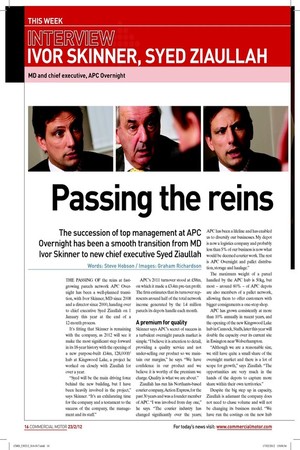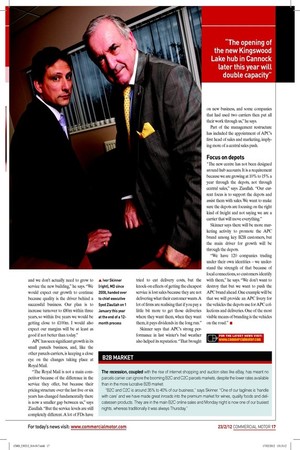Passing the reins
Page 12

Page 13

If you've noticed an error in this article please click here to report it so we can fix it.
IVOR SKINNER, SYED ZIAULLAH
MD and chief executive, APC Overnight
The succession of top management at APC Overnight has been a smooth transition from MD Ivor Skinner to new chief executive Syed ZiauLLah
Words: Steve Hobson / Images: Graham Richardson
THE PASSING OF the reins at fastgrowing parcels network APC Overnight has been a well-planned transition, with Ivor Skinner, MD since 2008 and a director since 2000, handing over to chief executive Syed Ziaullah on 1 January this year at the end of a 12-month process.
It's itting that Skinner is remaining with the company, as 2012 will see it make the most signiicant step forward in its 18-year history with the opening of a new purpose-built £14m, 128,000ft2 hub at Kingswood Lake, a project he worked on closely with Ziaullah for over a year.
“Syed will be the main driving force behind the new building, but I have been heavily involved in the project,” says Skinner. “It’s an exhilarating time for the company and a testament to the success of the company, the management and its staff.” APC’s 2011 turnover stood at £58m, on which it made a £3.4m pre-tax proit. The irm estimates that its turnover represents around half of the total network income generated by the 1.4 million parcels its depots handle each month.
A premium for quality
Skinner says APC’s secret of success in a turbulent overnight parcels market is simple. “I believe it is attention to detail, providing a quality service and not under-selling our product so we maintain our margins,” he says. “We have conidence in our product and we believe it is worthy of the premium we charge. Quality is what we are about.” Ziaullah has run his Northants-based courier company, Action Express, for the past 30 years and was a founder member of APC. “I was involved from day one,” he says. “The courier industry has changed signiicantly over the years; APC has been a lifeline and has enabled us to diversify our businesses. My depot is now a logistics company and probably less than 5% of our business is now what would be deemed courier work. The rest is APC Overnight and pallet distribution, storage and haulage.” The maximum weight of a parcel handled by the APC hub is 50kg, but most – around 60% – of APC depots are also members of a pallet network, allowing them to offer customers with bigger consignments a one-stop shop.
APC has grown consistently at more than 10% annually in recent years, and the opening of the new Kingswood Lake hub in Cannock, Staffs, later this year will double the capacity over its current site in Essington near Wolverhampton.
“Although we are a reasonable size, we still have quite a small share of the overnight market and there is a lot of scope for growth,” says Ziaullah. “The opportunities are very much in the hands of the depots to capture more share within their own territories.” Despite the big step up in capacity, Ziaullah is adamant the company does not need to chase volume and will not be changing its business model. “We have run the costings on the new hub and we don’t actually need to grow to service the new building,” he says. “We would expect our growth to continue because quality is the driver behind a successful business. Our plan is to increase turnover to £80m within three years, so within ive years we would be getting close to £100m. I would also expect our margins will be at least as good if not better than today.” APC has seen signiicant growth in its small parcels business, and, like the other parcels carriers, is keeping a close eye on the changes taking place at Royal Mail.
“The Royal Mail is not a main competitor because of the difference in the service they offer, but because their pricing structure over the last ive or six years has changed fundamentally there is now a smaller gap between us,” says Ziaullah. “But the service levels are still completely different. A lot of FDs have tried to cut delivery costs, but the knock-on effects of getting the cheapest service is lost sales because they are not delivering what their customer wants. A lot of irms are realising that if you pay a little bit more to get those deliveries where they want them, when they want them, it pays dividends in the long run.” Skinner says that APC’s strong performance in last winter’s bad weather also helped its reputation. “That brought on new business, and some companies that had used two carriers then put all their work through us,” he says.
Part of the management restructure has included the appointment of APC’s irst head of sales and marketing, implying more of a central sales push.
Focus on depots
"The new centre has not been designed around hub accounts. It is a requirement because we are growing at 10% to 15% a year through the depots, not through central sales,” says Ziaullah. “Our current focus is to support the depots and assist them with sales. We want to make sure the depots are focusing on the right kind of freight and not saying we are a carrier that will move everything.” Skinner says there will be more marketing activity to promote the APC brand among key B2B customers, but the main driver for growth will be through the depots.
“We have 120 companies trading under their own identities – we understand the strength of that because of local connections, so customers identify with them,” he says. “We don’t want to destroy that but we want to push the APC brand ahead. One example will be that we will provide an APC livery for the vehicles the depots use for APC collections and deliveries. One of the most visible means of branding is the vehicles on the road.” ■
B2B MARKET
The recession, coupled with the rise of internet shopping and auction sites like eBay, has meant no parcels carrier can ignore the booming B2C and C2C parcels markets, despite the lower rates available than in the more lucrative B2B market.
“B2C and C2C is around 35% to 40% of our business,” says Skinner. “One of our taglines is ‘handle with care’ and we have made great inroads into the premium market for wines, quality foods and delicatessen products. They are in the main B2C online sales and Monday night is now one of our busiest nights, whereas traditionally it was always Thursday.”












































